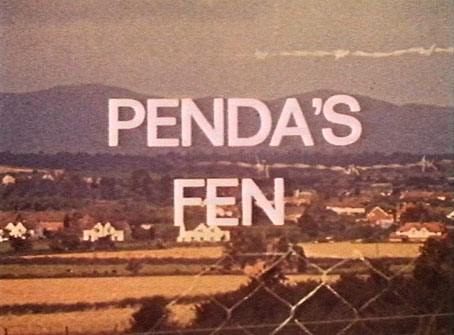
This is a post I’d been intent on writing for the past four years but kept putting off: why go to great lengths to describe another television drama which people can’t see? And how do you easily appraise something which haunted you for twenty years and which remains a significant obsession? My hand has been forced at last by a forthcoming event (detailed below) so this at least has some fleeting relevance, but before getting to that let’s have some facts.
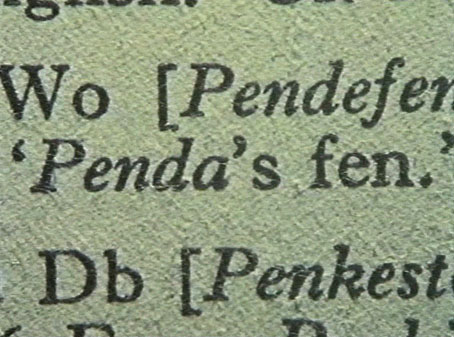
Penda’s Fen was a TV play first screened in March 1974 in the BBC’s Play For Today strand. It was shot entirely on film (many dramas in the 1970s recorded their interiors on video) and runs for about 90 minutes. The writer was David Rudkin and it was directed by Alan Clarke, a director regarded by many (myself included) as one of the great talents to emerge from British television during the 1960s and 70s. The film was commissioned by David Rose, a producer at the BBC’s Pebble Mill studios in Birmingham, as one of a number of regional dramas. Rudkin was, and still is, an acclaimed playwright and screenwriter whose work is marked by recurrent themes which would include the tensions between pagan spirituality and organized religion, and the emergence of unorthodox sexuality. Both these themes are present in Penda’s Fen, and although the sexuality aspect of his work is important—pioneering, even—he’s far from being a one-note proselytiser. Alan Clarke is renowned today for his later television work which included filmed plays such as Scum (banned by the BBC and re-filmed as a feature), Made in Britain (Tim Roth’s debut piece), The Firm (with Gary Oldman), and Elephant whose title and Steadicam technique were swiped by Gus Van Sant. Penda’s Fen was an early piece for Clarke after which his work became (in Rudkin’s words) “fierce and stark”.
The most ambitious of Alan Clarke’s early projects, Penda’s Fen at first seems a strange choice for him. Most scripts that attracted Clarke, no matter how non-naturalistic, had a gritty, urban feel with springy vernacular dialogue (and sometimes almost no dialogue). David Rudkin’s screenplay is different: rooted in a mystical rural English landscape, it is studded with long, self-consciously poetic speeches and dense with sexual/mythical visions and dreams, theological debate and radical polemic—as well as an analysis of Elgar’s The Dream of Gerontius. But though Penda’s Fen is stylistically the odd film out in Clarke’s work, it trumpets many of his favourite themes, in particular what it means to be English in the last quarter of the twentieth century.
Howard Schuman, Sight & Sound, September 1998
Spencer Banks is the principal actor in Penda’s Fen, playing Stephen Franklin, an 18-year-old in his final days at school. The BBC’s Radio Times magazine described the film briefly:
Young Stephen, in the last summer of his boyhood, has somehow awakened a buried force in the landscape around him. It is trying to communicate some warning, a peril he is in; some secret knowledge; some choice he must make, some mission for which he is marked down.
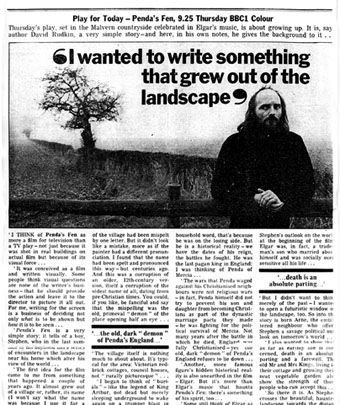
The magazine also interviewed Rudkin about the film:
“I think of Penda’s Fen as more a film for television than a TV play—not just because it was shot in real buildings on actual film but because of its visual force…
“It was conceived as a film and written visually. Some people think visual questions are none of the writer’s business—that he should provide the action and leave it to the director to picture it all out. For me, writing for the screen is a business of deciding not only what is to be shown but how it is to be seen…
“Penda’s Fen is a very simple story; it tells of a boy, Stephen, who in the last summer of his boyhood has a series of encounters in the landscape near his home which alter his view of the world…
“The first idea for the film came to me from something that happened a couple of years ago. It almost grew out of a village or, rather, its name (I won’t say what the name was because I use it for a special reason in the film). My wife was coming home one day when she found the road to the village closed. There was a diversion sign—and the name of the village had been misspelt by one letter. But it didn’t look like a mistake, more as if the painter had a different pronunciation. I found that the name had been spelt and pronounced this way—but centuries ago. And this was a corruption of an older, 12th-century version, itself a corruption of the oldest name of all, dating from pre-Christian times. You could, if you like, be fanciful and say that the misspelling was the old, primeval ‘demon’ of the place opening half an eye…“The village itself is nothing much to shout about. It’s typical for the area: Victorian redbrick cottages, council houses, not ‘rurally picturesque’…
“I began to think of ‘burials’—like the legend of King Arthur, not dead but merely sleeping underground to wake again on a trumpet blast in England’s hour of peril. But I was becoming interested in another king—only a century after Arthur. And, if this king’s name is not exactly a household word, that’s because he was on the losing side. But he is a historical reality—we have the dates of his reign, the battles he fought. He was the last pagan king in England; I was thinking of Penda of Mercia…
“The wars that Penda waged against his Christianised neighbours were not religious wars—in fact, Penda himself did not try to prevent his son and daughter from becoming Christians as part of the dynastic marriage pacts they made—he was fighting for the political survival of Mercia. Not many years after the battle in which he died, England was Christianised—yet the old, dark ‘demon’ of Penda’s England refuses to lie down…
“Another, more famous figure’s hidden historical reality is also unearthed in the film—Elgar. But it’s more than Elgar’s music that haunts Penda’s Fen: there’s something of his spirit, too…
“Some still think of Elgar as the archetypal country gentleman whose music enshrines the noblest sentiments of patriotism and faith. That way of looking at him is similar to Stephen’s outlook on the world at the beginning of the film Elgar was, in fact, a tradesman’s son who married above himself and was socially over-sensitive all his life…
“But I didn’t want to think merely of the past—I wanted to open a futuristic window on the landscape, too. So into the story is borne Arne, the embittered neighbour who offers Stephen a savage political outlook on tomorrow’s world…
“I also wanted wanted to show that as far as earthly life is concerned, death is an absolute parting and a farewell. The old Mr and Mrs Kings, living in their cottage and growing their neat vegetable garden also show the strength of those people who can accept this…
“So there it is. As Stephen crosses the beautiful, haunted landscape towards the distant hills, his false certainties are one by one, stripped away. And finally, he looks back across the landscape and sees it with a new, harder sight…
Rudkin’s play is essentially a psychodrama in which the character of Stephen is shocked out of his priggish, conservative attitudes by a succession of personal and spiritual revelations. His parents inform him on his 18th birthday that he was adopted; his dreams reveal a growing awareness of his homosexuality and he’s chastised at school by teachers and the other boys for not fitting in; he discovers that his apparently mundane Rector father has authored a study of the Bible which argues that the original Gospels were malevolently tampered with in order to distort the radical message of the historic Jesus. The Malvern countryside becomes a psychic battleground in which the agents of a “pure” Christianity (the Gospel tamperers, in other words) compete with the nation’s buried pagan ancestry for Stephen’s soul which we can read as representing the future of Britain. The wealth of symbolism is rich without ever being forced and it’s partly this which makes the film so remarkable. An example: Stephen’s name is almost certainly a reference to Saint Stephen who was martyred by being stoned to death (in one of Stephen’s dreams we see him being pelted with mud). Rudkin is a Classical scholar (he provided the commentary on Greek matters in Tom Phillips’ and Peter Greenaway’s A TV Dante), as is Stephen’s character, and both the schoolboy and the writer would know that “Stephen” is a derivation of the Greek “Stephanos”, meaning “crown”; Stephen’s character is eventually seen as the inheritor of a spiritual kingship. Like Lindsay Anderson’s If…., the film is anti-authoritarian in a distinctly English way, standing against the orthodoxies of a poisonous and poisoning State and Church, and against attempts to enforce “purity” and “normality”. It should be noted that Rudkin is never anti-Christian, he’s against the contemporary manifestations of a religion which has lost sight of its origins.
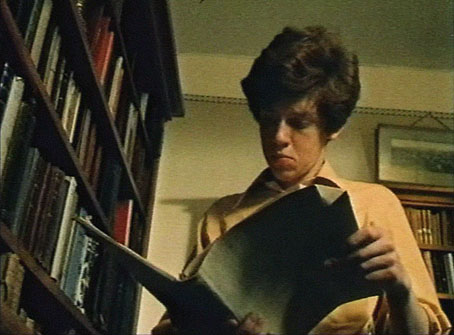
Stephen (Spencer Banks) discovers his father’s manuscript.
The layered symbolism and discussion of metaphysical crisis was extremely bewildering to this 12-year-old TV viewer who was somehow allowed to watch the whole of the film past his usual bedtime. Spencer Banks was very familiar from a children’s science fiction series, Timeslip (1970-72), in which Banks played a bespectacled, slightly geeky character with whom I—being bespectacled and slightly geeky—naturally identified. In Penda’s Fen he appears wearing a bomber jacket like one I wore at the time, so the overall impression was of watching an older avatar of myself undergoing a bizarre rite of passage. None of it made any sense at all and the sexual aspect was completely lost on me; what was impressive and somewhat traumatising was the atmosphere of dread which accumulated in a succession of powerful, supernatural and—in one startling incident—uniquely horrifying scenes. Alan Clarke gives the dreams his usual documentary veracity but you’ll have to forgive my refusal to discuss any of those scenes in detail, to do so would spoil the effect and resonance of individual moments; the film should be experienced as a whole. It was the dreams and hallucinatory moments which I remembered for years after but, to my endless frustration, not the play’s title. Throughout the rest of the 1970s and most of the 80s no one I knew had seen it and consequently those disturbing images developed an additional power and mystery as they entangled themselves with my own dreams and memories. In the late 1980s the magic words “Penda’s Fen” came to light when it turned out that comics writer Grant Morrison was a Rudkin enthusiast who had also been haunted by the film. Grant later told me that a friend of his had corresponded with Rudkin in the 1970s so he’d got to Rudkin’s other work a lot sooner, and Rudkin’s plays have been an influence on Grant’s own work for the stage. What most frustrates me now is that I distinctly remember an announcement after the film that Rudkin would be discussing the drama in a following program. Given the BBC’s negligent handling of its output there’s no guarantee that this studio discussion has survived.

Penda’s Fen might have remained as buried as its ancient king had it not been screened again on Channel 4 in 1989 as part of a retrospective season of dramas produced by David Rose. That gave me the chance to record it at last and I’ve been acting as a cheerleader for the film ever since. (I also carefully transferred my copy to DVD in 2003, worried that the tape might get damaged and I’d lose the thing again.) It’s likely that I’m partly responsible for its renewed cult reputation having alerted various friends in the music and publishing world to its existence. The film is increasingly cited in discussion of Britain’s heritage of folk and pagan culture, most recently by Rob Young in a piece for Sight & Sound. Perhaps inevitably, the film has been ushered into the charmed circle of revenant Ghost Box icons, and will be receiving a rare screening at the Belbury Youth Club event this coming Sunday, March 28th, along with other films and music which comprise the Flatpack Festival 2010. If you’re in the Birmingham area, the Flatpack events run throughout this coming week.
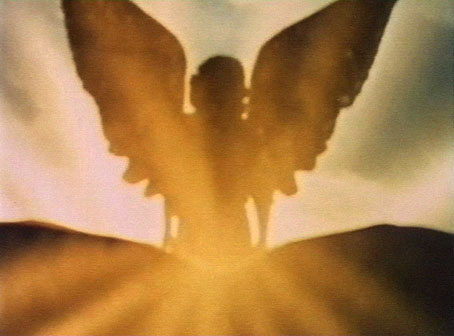
Rudkin’s play wasn’t a one-off, his other work is equally powerful, engaging and fascinating. A later film for the BBC, the wildly ambitious Artemis 81, is three hours in length (!) and explores similar themes, albeit in a less coherent fashion. It also includes Daniel Day-Lewis’s first screen appearance and has Sting playing Hywel Bennett’s angelic object of homoerotic desire. Rudkin’s stage work is fiercely imaginative, using Joycean dialogue to striking effect, and I’m continually surprised that no one seems interested in re-staging remarkable plays such as The Sons of Light. As for Penda’s Fen, whenever a TV executive tries to argue that television hasn’t dumbed down I’d offer this work as Exhibit A for the prosecution. Rudkin and Clarke’s film was screened at 9.35 in the evening on the nation’s main TV channel, BBC 1, at a time when there were only three channels to choose from. A primetime audience of many millions watched this visceral and unapologetically intelligent drama; show me where this happens today.
Finally, as with the Beardsley play, yes, I have my own copy but, no, I can’t copy it for you, so please don’t ask. Artemis 81 appeared on DVD in 2007 but a proposed release of Alan Clarke films from the BBC including Penda’s Fen has yet to emerge. A DVD set of Clarke’s later work appeared a few years ago but these were all the violent dramas which tends to skew perception of his career and make him appear as a kind of Stanley Kubrick with a Stanley knife. Given Clarke’s reputation and the growing cult status of Penda’s Fen it’s surely time to put this unique drama before a wide audience once again.
Previously on { feuilleton }
• A TV Dante by Tom Phillips and Peter Greenaway
• Aubrey by John Selwyn Gilbert
• If….
• Ghost Box
• David Rudkin on Carl Dreyer’s Vampyr

Excellent post, John! I’ve been haunted by this myself since I saw my then landlord’s videotaped copy of the 1989 repeat. Can’t recollect where I originally heard about it, but I seem to remember being quite excited to finally have a chance to watch it. As you say, it’s the visionary aspects that lodge in the memory. Unlike Artemis 81…
Terrific stuff, John. Have forwarded the link to all the Fennites I’ve ever loaned a copy to…
Dave: for a long time Grant Morrison was the only person anywhere who I’d see mentioning Rudkin’s work. Until very recently Penda’s Fen was only referred to elsewhere for its Alan Clarke connection.
I think I’m probably in a minority which likes Artemis 81 a great deal, flaws and all. I’d much prefer to see someone trying too much and it not quite working than what we get all the time today, people trying far too little or just giving us more detective dramas and lazy science fiction.
Don’t think I heard about it via Grant Morrison. I was barely aware of him when I saw it back in 1990, but it was definitely some kind of vaguely esoteric connection. Derek Jarman perhaps.
Penda was David Rose’s proudest achievement at the BBC which is really saying something. Artemis 81 was his swansong before moving to Channel 4 of course and I personally think it’s a hugely impressive piece of work. Rudkin’s DVD commentary is the greatest film studies lecture ever, and brilliant for anyone who has never been able to fully unpack the play. Even then, you’ll learn ten new things.
There was rumour of an Alan Clarke at the BBC set from 2Entertain a couple of years ago but it seems to have died off. Shame. His range went far beyond the brutalist minimalism of the 80s films.
Hi Ian. I seem to recall David Rose saying as much in an interview, I think he even said it should have been a feature film.
I hope 2Entertain are the people who do another Alan Clarke collection. I just bought their four-disc Alan Bennett box and it would be great to see Clarke’s work given the same treatment. His adaptation of Jim Cartwright’s Road is a particular favourite. And they could drag in the Bowie fans with Baal…
I’ve been wanting to see this (and Red Shift) since reading Grant M’s praise in a few of his early interviews – I drew a vast and rewarding amount of reading and viewing material out of his recommendations, back in the days when finding out about books and films involved a lot of luck and hard work (to say nothing of getting your hands on them afterwards – I had many an odd look aimed at me in the local bookshop when long-standing small press orders finally turned up for collection).
Sadly I missed the repeat, but having been reminded of it now I’m sure it must be available online somewhere. It seems like an obvious candidate for a BFI or Network DVD release, sitting alongside the Nigel Kneales etc.
I see on the library catalogue here at work we have a play called The Saxon Shore in stock, which appears to involve werewolves, so I’ll be sure to check that out.
Red Shift is another good one (and another Play For Today), Alan Garner did an excellent job of adapting his novel. Garner’s concerns intersect with Rudkin’s in many areas.
Garner’s not so difficult to access, thanks to The Owl Service. I wasn’t aware that Rudkin was responsible for the BBC adaptation of MR James’ The Ash Tree, which I do have… somewhere. I’ll dig it out for another viewing.
I’d like to at least read, if not see, Morrison’s plays, but unfortunately I was away from comics when his Lovely Biscuits collection came out, and that seems to go for around £100 nowadays.
For a long time memories of those MR James adaptations were entangled with Rudkin’s film, especially A Warning to the Curious which I saw when it was first broadcast; the battered crown had a correspondence with the appearance of King Penda. I saw The Ash Tree when it was first screened as well but it was years before I was able to connect the two films. The Ash Tree holds up well, I think, whereas Lost Hearts which preceded it now seems silly rather than scary unless you read the thing in the light of today’s child murderers.
Oh, and Grant’s plays: Red King Rising is a very good riff on Alice in Wonderland and the Alice/Dodgson relationship. I don’t remember so much about Depravity despite its being about Aleister Crowley. I ought to give it another read.
Red Shift is indeed a fine piece of work.
Rudkin continued his work in radio once television gave up on him. A favourite is The Giant’s Cause from about 2005 – I seem to have misfiled my copy – which starred James Ellis and presages Jez Butterworth’s Jerusalem in some respects.
I answered this elsewhere, but the BBC2 discussion programme mentioned in your original blog post was live and is indeed wiped. The written archive was checked a few years ago for a transcript but nothing found. It was a 45mins show called Real Time.
Depravity, as I recall, incorporated a Crowley ritual (mass?) into the on-stage activities. I badgered my then drama tutor in 89 (I expect) to track down a copy of Red King Rising on the basis that it won a Guardian award – no joy, of course. And to be fair the only sources I had for the award (and mass) information were interviews with Grant, who was sprinkling everything liberally with exaggerations and inventions. Which reminds me, must check Amazon for Sick Buildings and that Warhol biography. No, nothing yet.
Thanks, Ian. I rarely listen to the radio so I miss all manner of things there. Rudkin has also worked on a couple screenplays in recent years although I’ve not seen any of the films.
Re: Grant’s play. Yes, there’s an enactment of Crowley and Neuberg’s summoning of Choronzon in the Sahara desert. The play switches between a psychological discussion and Crowley’s assertions about the nature of magick. Sounds very esoteric but audiences who are happy to sit through expositions of quantum mechanics by Michael Frayn or Tom Stoppard shouldn’t have a problem with it.
The Afternoon Play
‘The Giant’s Cause’ by David Rudkin
17 May 2005
http://www.sendspace.com/file/1nk8lu
Enjoy!
Thanks!
Marvelous to know about this; now I want to see it somehow. I’ll go looking. I was drawn to this sort of material, and story, at an age earlier than its protagonist; and that has never gone away.
I also read those Alan Garner novels already mentioned, at that age, and recommend them highly.
Thank you.
A very good post.
Note: for anyone in London wanting to see this film they can view it in the BFI mediatheque for free.
I’m not sure if it’s common knowledge but Rudkin’s Penda’s Fen screenplay was published by Davis-Poynter in 1975. Not having any idea of this I was delighted to find it in a second-hand bookshop for next-to-nothing a few years ago.
Hi Richard. Yes, I knew about this as it’s listed in Rudkin’s other play books. I tried to order a copy many years ago when it was still listed as being in print but none were available. This was before AbeBooks put the world of the OOP at our fingertips.
almost unrelated aside:
you should devote a section or tag (sorry Im not familiar with the minutae of blogs) to old school bbc productions, most of them are simply brilliant
I recently watched “the triffids” (and wasnt the modern american remake a travesty) (and have the americans ever successfully translated something for their home market without completely sucking the soul from the origional?) and “the tripods”, they both transported me to an earlier self, one wide eyed with horror and wonder.
Its not often you find something almost transcendent between the plastic covers of a dvd.
Looking back to that era the originality of Pendas Fen put it up there with the Prisoner.I remember watching it on it’s first showing when I was still in college,the whole common room was abuzz the next day,how times have changed,I now lecture in the same college and all he kids talk about is celebs how things change.
Penda’s Fen is an amazing drama. If only the BBC still had Play for Today!
There is a weekend devoted to the work of David Rose at mac in Birmingham from 2-4 July 2010. It Came From Pebble Mill is a celebration of the remarkable range of drama produced at BBC Birmingham during the 1970s and early 80s under Rose. This includes a screening of Penda’s Fen on Sunday 4 July at 4.30pm. For more information please see: http://www.macarts.co.uk
John,
Apologies if I’m behind the times on this but I thought you might like to know that Penda’s Fen plays a significant role in Rob Young’s forthcoming study of British 20th Century Visionary Music and the folk tradition, Electric Eden .
Annabel: Thanks, I’ll mention that in my weekend links.
Andrew: I’d have guessed as much, especially since he mentioned Elgar recently in a piece about Vaughan Williams for the Guardian.
Penda’s Fen on Youtube: http://www.youtube.com/watch?v=i9mOnj8xn-w&feature=related
Sorry this is a bit late; but has Rudkin ever put anything into the public domain about the autobiographical nature of Penda. He is commonly identified with Arne, for obvious reasons, but Stephen is modelled closely on Rudkin’s own school days, which he of course shared with over 500 contemporaries of whom I am but one. Rudkin has quite deliberately identified the school, its ethos, and its practices in numerous small ways, mostly in the photoplay. It would be tedious (and very time consuming) to list these, and I don’t wish to upset the guy, but (for example) somewhere out there there is a real Honeybone who as far as I remember was just a typical teenager of the period (you could try the Birmingham ‘phone book).
Flying Stag: Did you say you have the published screenplay? I don’t (and book dealers want stupid money for it) so I’ve no idea whether he says anything about the work in there. The published editions of his other plays include short notes from the author. All I’ve seen him state about this work is either on his website or in the quoted piece above.
Yes, Rudkin is naturally going to be identified with Arne but that doesn’t necessarily prevent him from using his own interests or experience for one or more characters in the same piece. Many authors will tell you that there’s a piece of themselves in all their characters, good or bad. One place to look for further information might by an academic study by David Ian Rabey, David Rudkin: Sacred Disobedience: an expository study of his drama 1959–96. Another book I don’t own…
I’ve never taken Honeybone’s name as being anything other than a pretty broad phallic metaphor even though that character may have been based on a real person. I think I’ve read that his first play was based on his own experience of farm work so there’s already a precedent for using his life as material.
Thanks for that John. I don’t have any printed literature, but I’ll be considering ‘Sacred Disobedience ………’ as a possible Xmas present.
The autobiographical aspect is interesting eg Rudkin himself did indeed ‘renege on his military apprenticeship’, a unique and extraordinary event at the time (c1953) which was widely noticed throughout the school. It is interesting that he has not (yet) acknowledged this, whereas he has in the case of his work on a Bromsgrove farm which inspired ‘Afore Night Come’. And Jonathan Coe, who went to the same school c20 years later, and is equally explicit in his detailed references to the minutiae of school life, acknowledged the influence of his schooldays on ‘Rotter’s Club’ and ‘Closed Circle’.
Knowing Honeybone to be a real name, the phallic metaphor had escaped me entirely! (The UK surname distribution maps show the name to exist in a small handful of postcode areas).
Thanks, that’s a fascinating point about the Honeybone name, a great example of a writer being able to bend a small concrete fact to a symbolic purpose.
Not all of Rudkin’s work uses his own biography; two later TV plays, Artemis 81 and The White Lady, don’t appear to. Nor do the stage plays I’ve read. It might be argued that Penda gains some of its considerable power from the manner in which it draws on his own experience.
I’ve just buckled and ordered a copy of the Rabey book myself. AbeBooks.com is a real temptation sometimes.
Hi
I played huw halfbacon in the owl service theres lookyou now boyo
A comment Rudkin might enjoy: in Robert Simpson’s symposium ‘The Symphony’, someone wrote of Tippett’s second symphony – ‘despite these criticisms, this work leaves most contemporary symphonies asleep at the post; it is only by the standards that Tippett has set himself that one can criticise it’. The same is true of ‘Penda’ as compared with 99 percent of TV drama screened during my lifetime. An astonishingly ambitious playwright – I think of him as bracketed with the likes of Herzog or Wim Wenders rather than the average screenplay hack writing for British TV. He deserved better breaks and bigger budgets.
I treasure a copy of Penda’s Fen I got from a company (now defunct) called raretv.com. (Or I think it’s defunct.) I agree with the earlier post that the BBC need to release a boxed set of Clarke’s work including (obviously) PF, Road & any of the many Play for Todays he did. I signed internet campaigns to have Warner Bros release O Lucky man on DVD (& another company to release If…) and both seem to have had an effect. Shouldn’t something like this be done?
Odd how, like me, a lot of men seem to have seen the play in their teens and been unaccountably but deeply moved by it. It’s a kind of English Death of Salesman maybe, in that it cuts down beneath the defences and is saturated in the dilemmas and historical legacies & dilemmas of one particular culture.
But: how might it play with the ladies, I wonder? Apart from Annabel above the interest in this wonderful film – on this blog anyway – seems to be almost entirely a male one. (I’m assuming that Flying Stag is probably a male..?) There is so much to love and admire in this film that I feel a reluctance to say this but: the women xters in the film are surely stereotypical/marginal? I say that & then of course reflect that the mutilation of women by men is one of the most powerful sequences in the film. In film, dare I say?
But the film needs to get out there again and be fought & argued over.
Can’t say how delighted I was that it made 76 in the Time Out list this week! And for a film that’s long been out of circulation! There IS a Penda after all!
Hi Martin. I don’t think the masculine interest in this particular work is solely down to the work itself, it’s more of a male thing in general. If you look on forums where old TV is being discussed it’s almost always men doing the talking. As for Penda’s Fen, it’s a film about one boy’s experience, he’s at an all-male school and he wouldn’t be interested in girls anyway!
If…. and O Lucky Man! had the advantage of being feature films so they were always going to get a release eventually (I have the DVDs of both). Old BBC films are always in a more precarious position. I didn’t know about the Time Out list, that shows how much the reputation of the film has increased recently, five years ago I doubt it would have received a mention.
Dear John,
I’ve been trying to identify a play which I saw on TV as a child in the 1970s and which has haunted me ever since. I think it could perhaps be Penda’s Fen. Is the song “Here we go round the Mulberry Bush” or something similar played at any point during it as that is what I recall accompanying a shocking scene?
Hi Rusalka. There’s nothing like that in Penda so it must be something else. TV of that period contained a few one-off oddities partly because there was more unique drama being commissioned either in Play For Today which included Penda and the Wicker Man-like Robin Redbreast, or in series like Menace. Most of the episodes filmed for the latter are now missing but I did see Boys And Girls Come Out To Play which may have included nursery rhymes or similar. The story as I recall it concerned gangs of kids getting together to kill adults. Peter Jeffrey who played the headmaster in If…. was a policeman trying to find out what was happening.
Im delighted to discover there are people out there who value the compelling shattering work of visionary writer David Rudkin. In an age when television has been reduced to quotas and formulisation and theatre in Britain lazily self satisfies itself with tepid issue-based drama and endless revivals.. we should hold our heads in shame that we have let this sitution arise… I call for a revival of innovative, thought-provoking drama !!!!! This is 2012… NOT 1963…There are major issues concerning the planet.. concerning all of us.. its high time producers and directors woke up…. if all we get is a diet of glorified soaps and stale period drama and police series….wake up !!! john
YES! I too was about your age when this film was first aired, and have been haunted by it ever since, despite having forgotten it’s title! So thank you for the reminder. It has appeared on YT and I am going to watch it again now. My recollection is also of mounting dread and disturbing visionary streams.